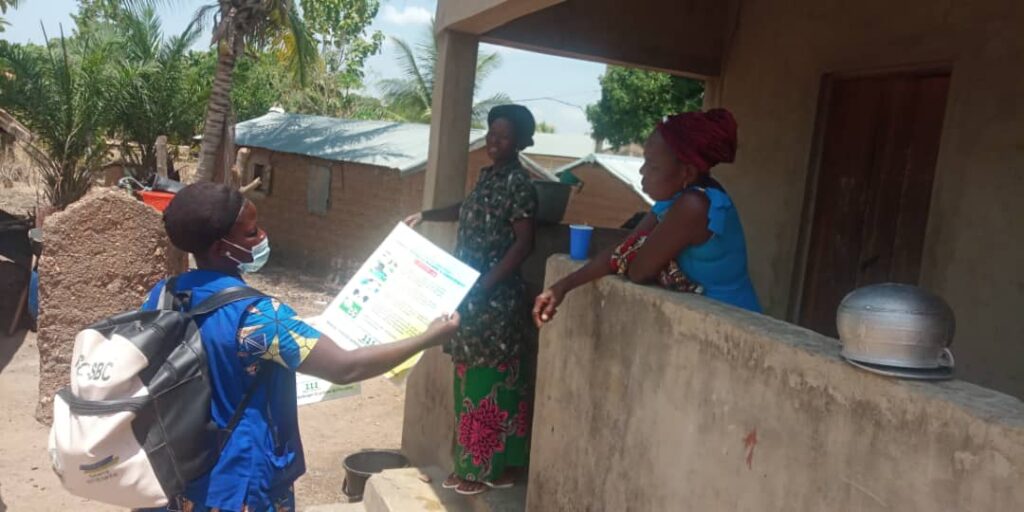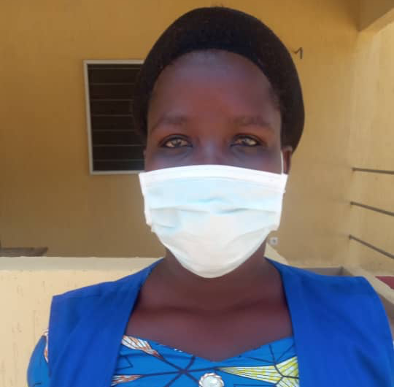Patawalo Essodom lives in the community of Sanda-Afahou in northern Togo. As a Community Health Worker, she spends a lot of time visiting her neighbors, teaching them how to protect themselves and their families from catching and spreading COVID-19. Patawalo has a natural advantage when spreading health information in her community, not only does everyone know and trust her, but she also speaks the same language, Kabye, as her neighbors.

Timely access to essential health information is vital during a pandemic. However, for rural communities like Sanda-Ahafou, accessing information can be a challenge. In Togo, roughly 65% of the population is literate and there are an estimated 40 languages spoken by the 8 million people living across the country. The most common forms of pandemic communications, informational packets or videos often do not consider this complexity. Most informational channels require literacy, technology or fluency in a non-native language such as French or English. In addition, Integrate Health recently conducted a community survey and found that the most trusted forms of health communication are community-focused sources such as radio, television, social networks, community health workers and public awareness events. Acknowledging the gap in health information resources for rural communities, Integrate Health leveraged our strong community relationships, and the most trusted forms of communication, to increase access to information through the use of tools that come from the communities in which we serve.
One of the first ways Integrate Health communicated quickly to communities, within days of the first confirmed case of COVID-19, was through the use village drummers. Across Togo, community leaders utilize village drummers when they need to spread a message. As the drums sound, the community understands there is an important message, and meets to listen. At the onset of the COVID-19 pandemic, Integrate Health teamed up with local chiefs to deploy village drummers in supported communities to deliver prevention information.
To complement the work of the drummers, Integrate Health, in collaboration with the Ministry of Health, supports and participates in ongoing weekly radio emissions, in local languages, throughout the region of Kara. The emissions offer an opportunity for community members to call in and ask questions about COVID-19, offering the community a vital lifeline to crucial information. Engagement with community also offers an opportunity for Integrate Health to better respond to community concerns. Early on, the Integrate Health team identified that many of the questions were not actually about COVID-19 but rather about the potential economic and household impacts from the travel and social distancing restrictions imposed to reduce transmission of COVID-19. These early questions provided Integrate Health with a better understanding of the concerns and fears of the communities and helped to inform our risk communications strategies.
Lastly, Community Health Workers (CHWs) like Patawalo, dedicate a large portion of their time to delivering essential health information. Immediately after the first confirmed case of COVID-19 in Togo, Integrate Health trained our 95 CHWs in COVID-19 prevention and treatment messaging. Due to their expertise translating health information for community members, integrating COVID-19 information into their regular house visits was seamless. Despite the extra work that comes with providing community education during a pandemic, Patawalo acknowledged how important her job is during this time. When asked about how COVID-19 has changed her work, she said “it is time for [CHWs] to take on a great challenge in front of our people, our country and the world that is watching us.”

Utilizing the most trusted forms of communication, and leveraging strong community resources, Integrate Health has continued to provide essential health education that would otherwise be inaccessible in its traditional forms, thereby strengthening community’s response to the pandemic.

